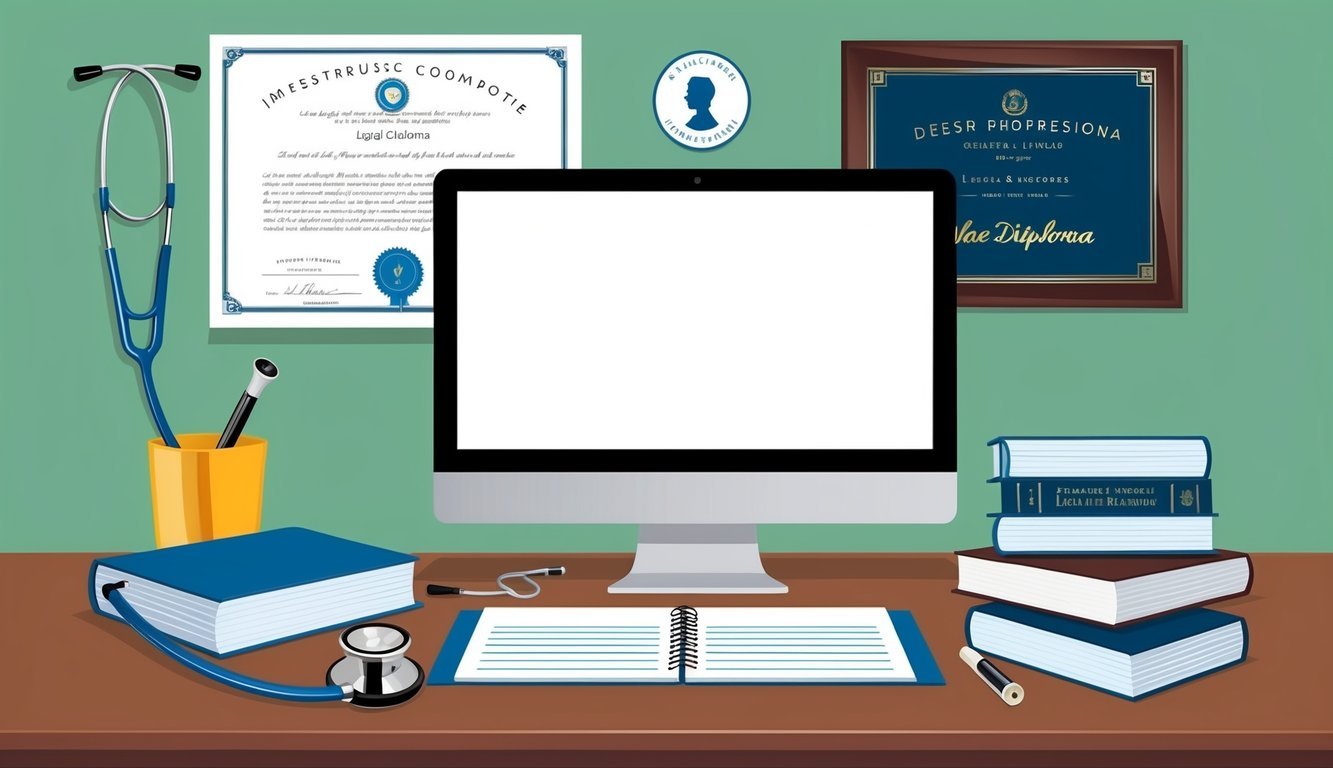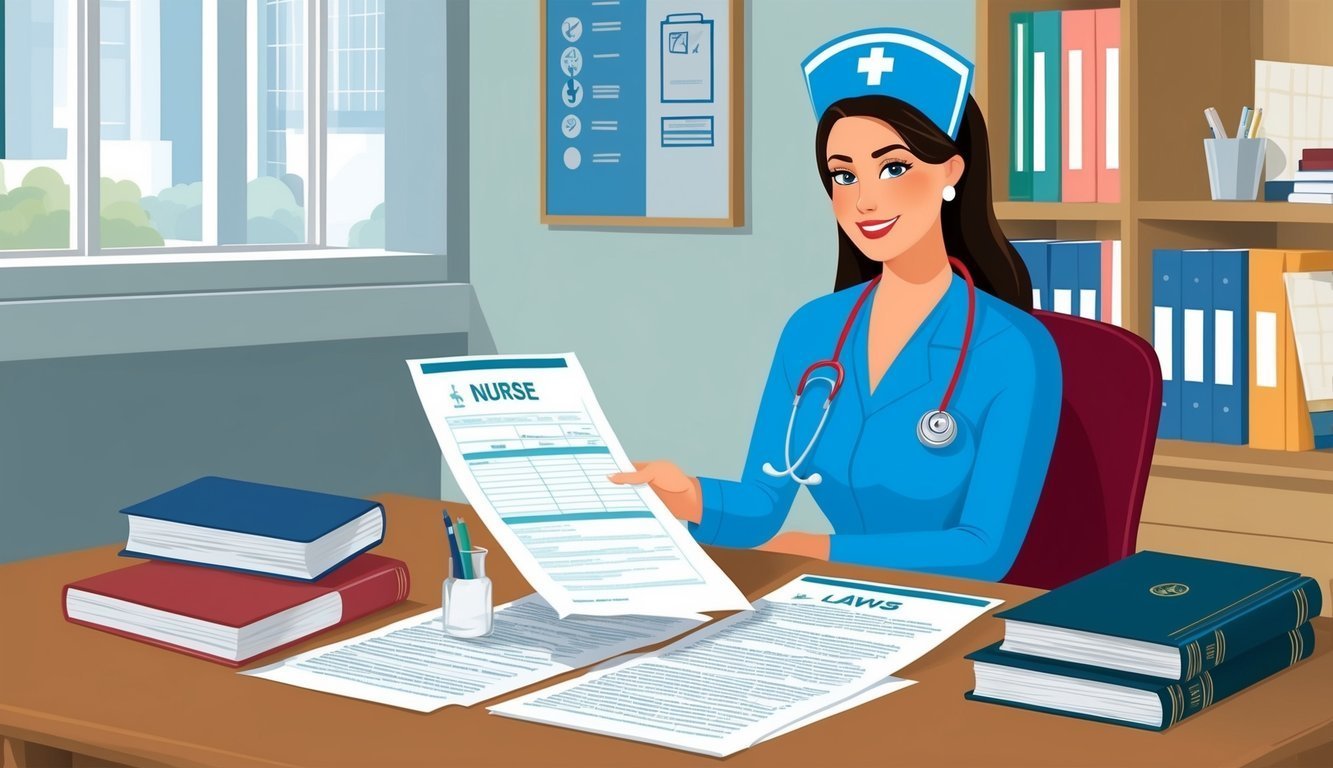Becoming a legal nurse consultant can be an enriching career choice that combines your nursing expertise with the legal field. To start your journey, you need to be a registered nurse and receive specialized training in legal nurse consulting.
This unique role allows you to work alongside attorneys, providing valuable insights into medical-related legal cases.
As a legal nurse consultant, your responsibilities may include reviewing medical records, providing expert testimony, and helping to interpret complex medical information for legal teams.
This specialization not only enhances your nursing credentials but can also lead to higher earning potential, with salaries ranging from $68,000 to $117,500 depending on various factors.
If you’re ready to make this transition, you can begin by exploring certification options and training programs tailored for legal nurse consultants.
Resources such as the guide on how to become a legal nurse consultant and certification details found at the LNCC Certification site will provide you with essential information to take your first steps in this promising field.
Understanding the Role of a Legal Nurse Consultant
As a Legal Nurse Consultant (LNC), you play a vital role in bridging the gap between healthcare and legal systems.
Your expertise is invaluable to legal firms, insurance companies, and healthcare facilities in navigating medical aspects of legal cases.
Core Responsibilities
Your primary responsibilities as a Legal Nurse Consultant include reviewing medical records and analyzing complex medical data.
You provide insights on issues like medical malpractice and personal injury cases, enabling legal teams to make informed decisions.
Additionally, you may serve as an expert witness in court.
In this role, you explain medical terms and concepts to judges and juries, ensuring that they understand the relevant medical evidence.
Collaborating closely with attorneys, you assess the strengths and weaknesses of cases, offering guidance on how to effectively present medical evidence.
Your skill in critical analysis helps legal professionals navigate cases more effectively.
Engaging with healthcare professionals also allows you to gather insights, making your analysis more robust.
Work Environment and Collaboration with Legal Teams
Legal Nurse Consultants typically work in diverse environments, including law offices, insurance companies, and healthcare facilities.
You may also work independently as a consultant, maintaining flexibility in your work schedule.
Collaboration is crucial in your role.
You often partner with legal teams, providing them with medical insights that influence case strategies.
Regular communication ensures that attorneys are well-informed about medical issues that could affect their cases.
Your interactions with legal and medical professionals also include preparing reports and summaries.
These documents are critical in articulating complex medical issues to those without healthcare backgrounds.
By providing accurate and clear information, you enhance the effectiveness of the legal team.
Prerequisites for Becoming an LNC

To become a Legal Nurse Consultant (LNC), you must meet specific educational and professional requirements.
A solid foundation in nursing through formal education, obtaining the appropriate licensure, and accumulating relevant nursing experience are crucial steps toward this career path.
Education and Nursing Degree
The first step toward becoming an LNC is obtaining a nursing degree.
You typically need to complete a nursing program, which can be either a two-year Associate Degree in Nursing (ADN) or a four-year Bachelor of Science in Nursing (BSN).
The BSN is often preferred, as it provides a more comprehensive understanding of nursing practices and theories.
In addition to core nursing courses, some programs offer specializations that can benefit your future role as an LNC.
Look for programs that emphasize critical thinking and legal aspects of nursing, which will be valuable in legal consultations.
For further exploration, consider resources like the American Association of Colleges of Nursing.
Registered Nurse Licensure
Once you have completed your nursing education, you must obtain your RN license.
This requires passing the National Council Licensure Examination for Registered Nurses (NCLEX-RN).
The NCLEX tests your knowledge and skills essential for safe nursing practice.
Each state has its own licensure requirements, so ensure you meet all specific criteria.
Maintaining active RN licensure is crucial for your credibility as an LNC, and some states may require ongoing continuing education.
For more information on state-specific requirements, visit the National Council of State Boards of Nursing.
Professional Nursing Experience
Before transitioning to a Legal Nurse Consultant role, you should accumulate relevant nursing experience.
Typically, employers look for at least two to five years of clinical experience in areas such as critical care, emergency room, or other specialties.
Hands-on experience ensures you have the skills to interpret medical records accurately and understand clinical terminology.
Additionally, strong communication skills are vital as you will articulate findings to legal professionals.
Participating in continuing education courses can also strengthen your expertise and keep you updated on nursing practices.
Legal Nurse Consulting Certification
Becoming a certified legal nurse consultant (CLNC) involves meeting specific eligibility criteria, navigating the certification process, and maintaining your credentials through continuing education.
This certification holds significant value in establishing your expertise in the legal nursing field.
Eligibility Criteria
To qualify for the legal nurse consulting certification, you typically need to meet the following requirements:
- License: You must hold a current and active nursing license in the United States.
- Experience: A minimum of two years of nursing experience is generally required, with a focus on clinical practice.
- Education: Completing a legal nurse consulting program is beneficial. Organizations like the American Association of Legal Nurse Consultants (AALNC) offer these educational opportunities.
Lesser-known programs may also exist, but they should align with AALNC standards to ensure reputability.
The Certification Process and Examination
The certification process begins with completing the necessary educational training, which prepares you for the LNCC exam.
Here’s a brief overview of the steps:
- Application: Submit an application to take the LNCC exam, including verification of your nursing license and clinical experience.
- Exam Structure: The LNCC examination consists of 200 multiple-choice questions and covers various areas pertinent to legal nursing. You have approximately four hours to complete it.
- Passing Score: A specific passing score is required to obtain the LNCC credential, which demonstrates your competency in legal nurse consulting.
By successfully completing these steps, you will become a certified legal nurse consultant (CLNC).
Continuing Education and Recertification
Maintaining your LNCC certification requires ongoing education and recertification to ensure that you stay current in the field.
This process includes:
- Continuing Education Units (CEUs): You are typically required to complete a set number of CEUs within a specified timeframe, which can be achieved through workshops, seminars, or online courses related to legal nurse consulting.
- Recertification Cycle: Most certifications require renewal every five years. This ensures that you remain knowledgeable about advancements in the field.
- Documentation: Keep thorough records of your CEUs and activities to facilitate the recertification process easily.
Ongoing education not only maintains your certification but also enhances your professional skills and knowledge.
Career Opportunities and Advancements

As a Legal Nurse Consultant (LNC), you have a range of career opportunities available in various specialized areas.
Advancing your education can lead to higher positions and greater expertise in the field.
Your work settings can also play a significant role in your career trajectory and job outlook.
Specialized Areas of Practice
Legal Nurse Consultants can focus on multiple specialties within the legal realm.
Some predominant areas include:
- Medical Malpractice: Assisting attorneys in understanding the intricacies of patient care and hospital practices.
- Personal Injury: Evaluating medical records for cases involving injuries due to negligence.
- Forensic Nursing: Involving analysis and testimony in criminal cases where medical evidence is crucial.
That’s not an exhaustive list.
Areas like product liability, toxic torts, and workers’ compensation also require specialized knowledge.
These specialties demand an understanding of both legal and medical concepts, making your role vital in legal proceedings.
Higher Education and Advanced Degrees
Pursuing further education can significantly enhance your career.
Many LNCs choose to obtain advanced degrees such as a Master of Science in Nursing (MSN) or a Doctor of Nursing Practice (DNP).
These qualifications may open doors to:
- Leadership roles in healthcare organizations.
- Opportunities in legal education or as instructors in nursing programs.
- Increased earning potential, with rates ranging significantly depending on your expertise and experience.
Institutions like Duke University and the University of Rochester offer comprehensive programs that can benefit LNCs.
Engaging in legal nurse consulting programs specifically designed for advanced practice will expand your knowledge and skills.
Diverse Work Settings and Job Outlook
Legal Nurse Consultants work in various environments, including law firms, insurance companies, and healthcare organizations.
This diversity can influence your experiences and career satisfaction.
Potential workplaces include:
- Law firms focusing on civil rights, employment discrimination, and elder law.
- Insurance companies dealing with risk management and regulatory compliance.
- Health Maintenance Organizations (HMOs) and Patient Safety Organizations (PSOs) that require expertise in patient care and legal implications.
The job outlook for LNCs remains positive, driven by an increase in litigation involving healthcare issues.
Opportunities in areas such as life care planning and Medicare set-asides are also expanding, reflecting the ongoing need for qualified professionals who can bridge the gap between nursing and law.
Essential Skills and Attributes for Successful LNCs
To excel as a Legal Nurse Consultant (LNC), you need a unique blend of skills and attributes.
Mastering these key areas allows you to bridge the gap between the medical and legal fields effectively.
Medical Expertise and Legal Acumen
Your nursing background is crucial; a solid understanding of medical terminology and procedures ensures you can interpret complex medical records accurately.
You must also grasp legal concepts related to medical malpractice, liability, and healthcare regulations.
Combining medical knowledge with legal awareness enables you to assist attorneys in evaluating cases.
For instance, being aware of pertinent laws allows you to identify critical information within medical documentation that may influence legal claims.
Participation in relevant continuing education programs can enhance your expertise.
Communication and Testimony Skills
Clear communication is vital when working with attorneys, clients, and juries.
You should be able to explain complex medical concepts in layman’s terms.
This skill is necessary when preparing for depositions or providing testimony in court.
You may also be called upon to present medical findings as an expert witness.
Thus, you should practice articulating your thoughts confidently and understanding courtroom procedures.
Active listening skills are equally important to grasp questions and respond accurately.
Analytical Thinking and Attention to Detail
As an LNC, you need strong analytical skills for reviewing medical records and sifting through vast amounts of data.
You need to identify inconsistencies or critical evidence that may affect a case’s outcome.
Paying meticulous attention to detail can make a significant difference in legal outcomes.
Establishing a systematic approach to analyzing medical documentation and developing case strategies can improve your effectiveness.
Utilizing checklists or outlining relevant factors can help you remain organized and thorough in assessments, ensuring no crucial detail goes unnoticed.
Economic Aspects of Legal Nurse Consulting

The economic landscape of legal nurse consulting reveals promising salary potential and various career paths.
This section addresses salary insights and considerations for freelancing or private practice.
Legal Nurse Consultant Salary Insights
As a legal nurse consultant, you can expect your salary to vary based on several factors, including experience, location, and type of employment.
According to Glassdoor data, the average salary for a legal nurse consultant is approximately $88,400 per year.
This figure can fluctuate significantly.
For instance, those in private practice may charge rates ranging from $150 to $500 per hour, depending on their expertise and whether they testify in court.
The Bureau of Labor Statistics (BLS) notes that the job outlook for nursing professionals remains positive, with strong demand anticipated in legal settings.
Freelancing and Private Practice Considerations
Choosing to freelance or operate in private practice as a legal nurse consultant offers flexibility but comes with responsibility.
As a freelancer, you set your rates.
These rates are often between $150 and $300 per hour, and can increase if you’re called as an expert witness.
However, running a private practice requires management skills.
You must handle marketing, client relationships, and administrative tasks.
This is unlike traditional employment where these aspects may be delegated.
Considerations for costs such as insurance, office space, and ongoing education are crucial.
Understanding these factors will help you navigate the economic aspects effectively.

